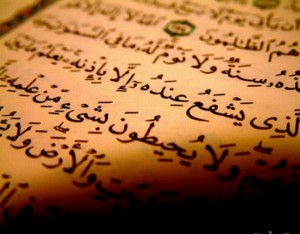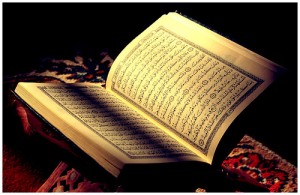In the name of Allah, the Beneficient, the Merciful

What is the Qur’an?
Basic definition of the Qur’an, Islam’s holy book.
“(This is the) Book (the Quran) sent down unto you (O Muhammad SAW), so let not your breast be narrow therefrom, that you warn thereby, and a reminder unto the believers. [Quran 7/2]”
The Qur’an is the last scripture that has been revealed to mankind by the Lord Creator and Protector. It was through the Last Messenger, Muhammad (s), that the world first heard of it. It certainly is the divine scripture that is to be accepted by all, upto the very last man.
The term ‘Qur’an’ has the meanings of ‘the recitation’, or ‘that which is to be recited’ and of ‘that which is recited.’
Unlike the earlier scriptures, the Qur’an is never a compilation of legal pronouncements or code of laws (Taurat), or hymns (Zaboor) or a collection of Gospel or good news (Injeel).
The Qur’an also describes itself as Kitab (book), Dhikr (guidance), Burhaan (evidence), Shifa (cure), Kayyim (that which is pure), Muhaymin (that which preserves the previous scriptures) and the like. Through these attributes the reader of the Qur’an is exposed to the clear picture of the morality enshrined within.
As far as its believers are concerned, the Qur’an is but the benchmart to distinguish truth from falsehood. They understand that all that has been commanded therein constitute the good and all that has been prohibited therein constitute evil. In fact, the Qur’an introduces itself as Furqaan (2:53, 2:185, 3:4, 25:1) which means ‘the criterion to distinguish between truth and falsehood.’
- Quran Recitation (6)
- Quran Translations (5)
- Verse of the Day (3)
 Reading the Qur’an
Reading the Qur’an
It is logical that one wanting to learn about a faith would start by reading its most holy text. For some, however, the Qur’an can be difficult to sit down and read from cover to cover. The revelation was given over a period of decades, and each verse has a particular scriptural and historical context. The themes of the Qur’an are interwoven among the chapters, and the book is not in chronologica…
Before You Read the Qur’an
It is logical that one wanting to learn about a faith would start by reading its most holy text. For some, however, the Qur’an can be difficult to sit down and read from cover to cover. The themes of the Qur’an are interwoven among the chapters, and the book is not in chronological order. So how does one begin to understand its message?
Qur’an Commentary & Companion Texts
When reading the Qur’an, it is often helpful to have more explanation of a given verse, or more historical background on a particular story told. These commentary and companion texts provide this extra information which can help aid your understanding of the Qur’an.
Qur’an Phonetic Search
Now you can search the Qur’an online for Arabic keywords, phonetically! Type in your Arabic search term using the Latin alphabet, and a list of Qur’anic matches will come up. Just spell it the way you hear it!
What does the Qur’an say about the Scriptures?
Say : We believe in Allah and what is revealed to us and what was revealed to Abraham and Ishmael and Isaac and Jacob and the tribes, and what was entrusted to Moses and Jesus and the prophets from their Lord.” (3:136) “The Qur’an recognizes all the scriptures that had been revealed before its own time.

However, the Qur’an does not, in an explicit fashion, state the total number of all such revealed scriptures. There is only the mention of the names of four other scriptures in the Qur’an.
These include the Taurat which was revealed to the Prophet Moosa (A), the Zaboor which was revealed to the Prophet Dawood (A) the Injeel which was revealed to the Prophet Isa (A) and the Qur’an itself which was revealed to the Prophet Muhammad (A). The Qur’an further highlights the fact that besides these four scriptures, other edicts, too, were revealed by the Lord Creator.
“And this is in the Books of the earliest (Revelations), The Books of Abraham and Moses.” (87:18,19)
The Qur’an attests the truth of all the previous scriptures. “It is He Who sent down to thee (step by step), in truth, the Book, confirming what went before it; and He sent down the Torah (of Moses) and the Gospel (of Jesus).” (3:3)
It is the compulsory duty of the Muslim to believe in all the scriptures that were revealed by Allah. Indeed, the Qur’an views the disbelief in the divine nature of any of the previous scriptures as a gross perversion.
“O ye who believe! Believe in Allah and His Messenger, and the scripture which He hath sent to His Messenger and the Scripture which He sent to those before (him). Any who denieth Allah, His angels, His Books, His Messengers, and the Day of Judgment, hath gone far, far astray.” (4:136)
The Qur’an and Science
In Islam, there is no conflict between faith in God and modern scientific knowledge. In fact, the Qur’an itself precisely describes many scientific phenomena.
 Request a Free Qur’an
Request a Free Qur’an
——————————————————————————————————–
A short presentation about the Quran (Video) by:
TEDxRainier-Lesley Hazleton
http://www.lastmiracle.com/?p=1295
——————————————————————————————————–
|
Facts about the Qur’an
 The Glorious Qur’an is the Word of Allah as revealed to His Prophet, Muhammad, peace be on him and his progeny. The Glorious Qur’an is the Word of Allah as revealed to His Prophet, Muhammad, peace be on him and his progeny.
 On reading the Qur’an one is at once convinced that it is the Word of Allah, for no man can write such perfect guidance on so many subjects. On reading the Qur’an one is at once convinced that it is the Word of Allah, for no man can write such perfect guidance on so many subjects.
 The Holy Qur’an says that no man will be able to forge even a part of it and that no corruption shall touch it from any side. It is a miracle that the Holy Qur’an has remained unchanged and unaltered during all these 1400 years and it shall remain so till the Day of Resurrection, for Allah, has taken it on Himself to protect it. The Holy Qur’an says that no man will be able to forge even a part of it and that no corruption shall touch it from any side. It is a miracle that the Holy Qur’an has remained unchanged and unaltered during all these 1400 years and it shall remain so till the Day of Resurrection, for Allah, has taken it on Himself to protect it.
 The Book of Allah is like an ocean. The less learned, like children, collect pebbles and shells from its shores. The scholars and thinkers, like pearl divers, bring out from it the highest philosophy, wisdom and rulse of a perfect way of living. The Book of Allah is like an ocean. The less learned, like children, collect pebbles and shells from its shores. The scholars and thinkers, like pearl divers, bring out from it the highest philosophy, wisdom and rulse of a perfect way of living.
 For easy dailiy recitation, the Qur’an is divided into thirty equal parts. One part takes only twenty-four reading minutes, and the whole Book requires twelve reading hours. There are 114 chapters, and 6,226 verses, containing 99,464 words made up of 330, 113 letters. For easy dailiy recitation, the Qur’an is divided into thirty equal parts. One part takes only twenty-four reading minutes, and the whole Book requires twelve reading hours. There are 114 chapters, and 6,226 verses, containing 99,464 words made up of 330, 113 letters.
 Millions of Muslims read the Qur’an daily. Imam Ja’far as-Sadiq has said that, the minimum dailiy reading of the Qur’an should be fifty verses or one-fourth of the part, about five minutes reading. Millions of Muslims read the Qur’an daily. Imam Ja’far as-Sadiq has said that, the minimum dailiy reading of the Qur’an should be fifty verses or one-fourth of the part, about five minutes reading.
Adapted from (Shakir, M.A.: Islamic History) |
 Reading the Qur’an
Reading the Qur’an However, the Qur’an does not, in an explicit fashion, state the total number of all such revealed scriptures. There is only the mention of the names of four other scriptures in the Qur’an.
However, the Qur’an does not, in an explicit fashion, state the total number of all such revealed scriptures. There is only the mention of the names of four other scriptures in the Qur’an. Arabic
Arabic English
English Spanish
Spanish Russian
Russian Romanian
Romanian Hindi
Hindi Tagalog
Tagalog Bengali
Bengali Sinhalese
Sinhalese Nepali
Nepali




